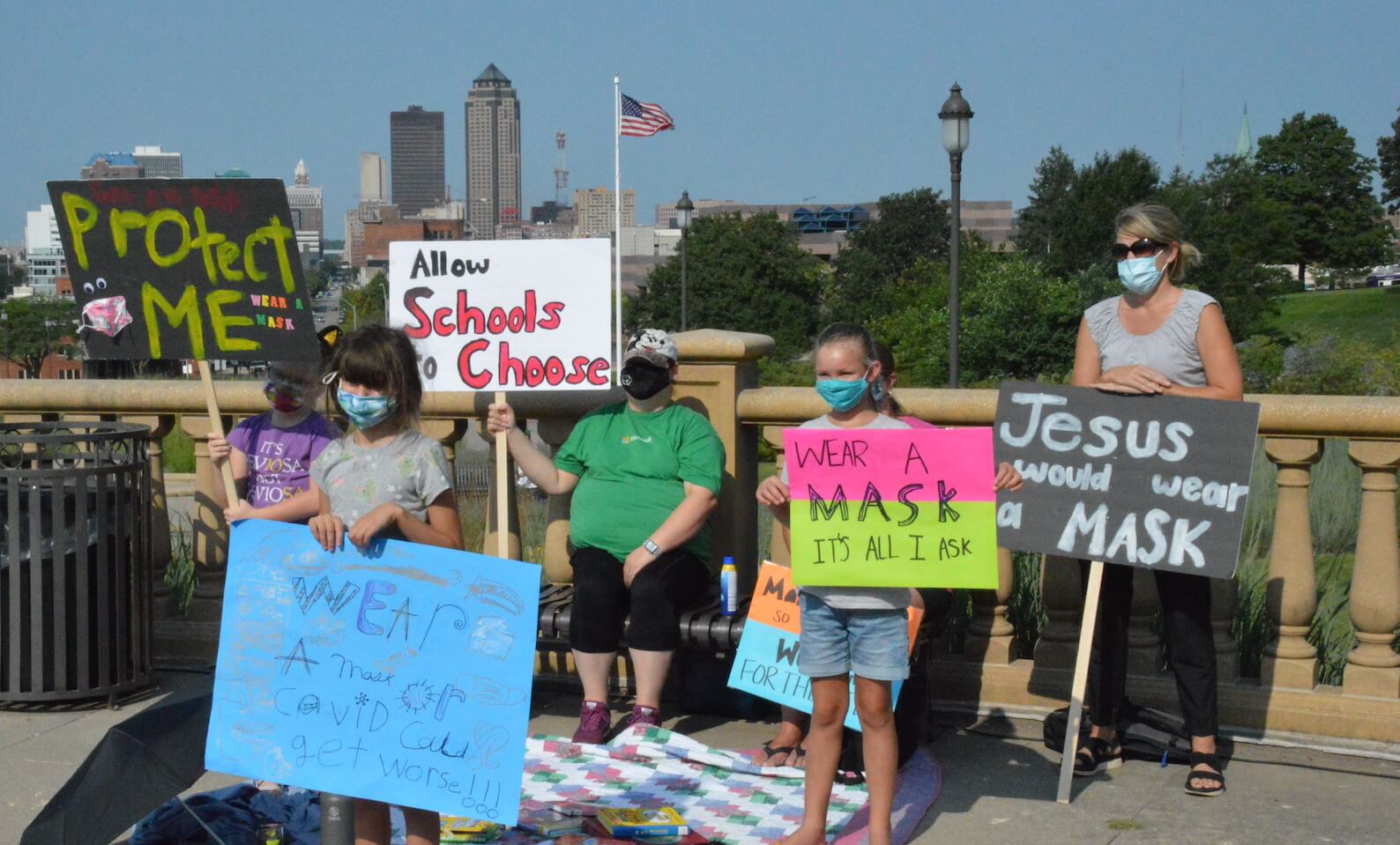
Photo by Starting Line staff
A guest column written by a budding science teacher and published by The Des Moines Register titled “COVID-19 is not a concern for young people” quickly drew ire on social media after going online on Wednesday.
Colin Coulter, who wrote the piece, earned an undergraduate biology degree from Iowa State University in 2012 and is enrolled in a Drake University teaching program. Coulter argues people ages 18-49 and children have little to fear when it comes to the coronavirus.
Iowa Starting Line reached out to Dr. Eli Perencevich, a leading Iowa expert on infectious diseases, to fact check Coulter’s column.
[inline-ad id=”1″]
One of Coulter’s first bullet points is that COVID death risk is low for children and people ages 18-49. Coulter said less than 400 children have died in American since the pandemic started and less than 10,000 adults ages 18-49 [The Register has since updated the column to note the number is around 32,000 for the 18-49 age range].
“Clearly, the risk of death and hospitalization increases with age, but just because young people and children are less likely to die—lower risk doesn’t mean no risk,” Perencevich said.
Perencevich said thousands of children have been hospitalized since the pandemic started and others are dealing with long-term COVID and other outcomes. He also said getting vaccinated greatly decreases the risk of dying from COVID.
[inline-ad id=”2″]
Another point by Coulter was that people who have contracted the coronavirus “have robust immunity.”
“It’s true that there is some infection protection that persists for several months, but the scientific data is clear that getting vaccinated boosts your immunity significantly,” Perencevich said.
There are many examples of people who contracted COVID once catching it again many months later.
“So spreading this misinformation that natural immunity is enough might lead people to avoid vaccination who will benefit the most, Perencevich said. “Every medical society recommends vaccination after COVID infection; it’s more protected.”
Citing a UCHealth study written before the emergence of the Delta variant, Coulter wrote almost half the people who contract the coronavirus don’t get sick, meaning they are asymptomatic.
“We don’t have a good handle on asymptomatic infection, but it does appear that getting vaccinated really cuts down symptomatic infection, so vaccination is still the best and safest way,” Perencevich said.
[inline-ad id=”3″]
Perencevich, who has been a practicing infections disease physician and epidemiologist for more than 20 years, added that they only have data for people ages 12 and above, but vaccination cuts hospitalization by 95% or higher.
“That’s the key thing to focus on,” he said. “Just because some people don’t get infected has no meaning when you have over 600,000 deaths in the United States and a lot of long COVID that allows suffering, hospitals filling up—that’s just a distraction.”
Because so much COVID discussion revolves around death, Perencevich said other elements such as the long-term effects get overlooked in the discourse.
“We don’t have that good of data on the long-term effects, although many young people that I know who got COVID, they lost their senses of smell and taste for over a year and who knows if it’s going to come back,” he said. “Many folks are extremely tired for months after infection or have trouble breathing, so it’s not a minor thing.”
[inline-ad id=”4″]
Coulter’s column offered a caution against the Moderna and Pfizer vaccines following a Food and Drug Administration (FDA) announcement that each could lead to increased risk of inflammation of the heart muscle or tissue surrounding the heart in teens and young adults.
Perencevich countered by noting the Pfizer vaccine is fully approved by the FDA and that the Moderna one is near approval.
“So they have enough safety data to show in these young adults that even if this myocarditis does occur, it almost universally resolves apart from rare occasions,” Perencevich said. “And the thing that these COVID minimizers do is they talk about a rare side effect among the vaccinated, which almost completely resolves.
“What they don’t talk about is the risk of myocarditis is magnitudes higher in that same age group if they get COVID. So just talking about a rare side effect that resolves and ignoring what happens with COVID is really just misinformation.”
[inline-ad id=”5”]
One of Colter’s final points was institutions should accept antibody tests as proof of immunity in addition to actual vaccination.
“COVID antibody tests just aren’t an accurate measure of immunity and so we should stick with the science that supports widespread vaccination,” Perencevich said.
Perencevich said “COVID minimizers” are coming out in full force and that their rhetoric is going to do more harm.
“This is going to lead to a lot of unnecessary illness and deaths among all age groups, especially unvaccinated children,” he said.
by Ty Rushing
08/25/21
[inline-ad id=”0″]

Iowa Republicans make outlawing gay marriage key 2024 campaign priority
Iowa Republicans have made outlawing gay marriage a key goal in their 2024 party platform. During the Iowa GOP’s 2024 state convention on Saturday,...

Department of Justice says Iowa immigration law violates US Constitution
If Iowa doesn’t suspend the enforcement of its new immigration law by May 7, the state could face a federal lawsuit, according to the Des Moines...

Rushing: Iowa State president said the quiet part out loud
I want to thank Iowa State University President Wendy Wintersteen for doing us all a favor by finally saying the quiet part out loud: all the...

Iowa sets aside almost $180 million for year two of voucher program
Iowa has committed nearly $180 million in taxpayer funds to support private school tuition in the 2024-25 school year, which is almost $50 million...

Kalbach: Immediate action needed on corporate ag pollution
Iowa agriculture has undergone substantial changes over the past 40 years. We see it all around us. Rather than crops and livestock being raised on...

VIDEO: Jochum calls Gov. Reynolds’ summer meal program a ‘hunger game’
Iowa Gov. Reynolds announced a competitive $900,000 grant program to feed Iowa children over the summer, months after she declined $29 million in...





